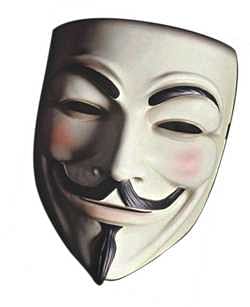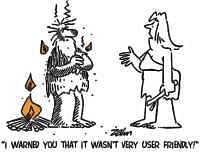Hacktivism FAQ
Who is Anonymous?
By Bareesh
 Everyone knows Anonymous by now. They're the most famous people on the internet. Well, probably. I don't actually know if they are. But if you haven't heard already, Anonymous, are a hacktivism group formed out of the depths of the trash can abyss of the Internet, known as 4chan. They're badassery has been spread even more since they shut down the FBI and US Department of Justice websites after Megaupload was taken down.
Everyone knows Anonymous by now. They're the most famous people on the internet. Well, probably. I don't actually know if they are. But if you haven't heard already, Anonymous, are a hacktivism group formed out of the depths of the trash can abyss of the Internet, known as 4chan. They're badassery has been spread even more since they shut down the FBI and US Department of Justice websites after Megaupload was taken down.
What exactly is Hacktivism?
Yes. People ask that. They can't figure it out. It's a fun wordplay using the words hack and activism. Quite ingenious, isn't it? Some people are convinced that they should hack websites to fight injustices like threatening piracy, and to promote political means. The term was coined by a hacktivist named Omega, a member of the group Cult of the Dead Cow, in 1998. It was defined as “the nonviolent use of legal and/or illegal digital tools in pursuit of political ends". Hacktivism spans across many political ideals but one aspect remains similar: they all want free speech, they all want free access to information. The Cult of the Dead Cow fought to turn access to information into a human right. The radical 1984 network liberty alliance was concerned with free speech and privacy in an age of heightened internet surveillance.
Hacktivism grows more controversial as it gains pace and importance. It is sometimes construed as cyberterrorism. Hacktivism now is many things. It's a politically constructive form of anarchic civil disobedience, anti-capitalism protests and/or immature gestures without a clear agenda.
So, “cyber terrorism” helped in stopping the evils of SOPA and stuff. Aren't the against-freedom-on-the-internet and against-the-righteous-practice-of-piracy people pissed about that?
Yes. Yes they are. But that's the beauty of the internet, it makes you very hard to catch. Anonymous seems to be going scot free at the moment but the FBI has cracked down on an associated, and pretty famous in it's own right hacktivist group, Lulzsec. Lulzsec is awesome in many ways. They have the “sir” meme as their logo, their motto is “"The world's leaders in high-quality entertainment at your expense” and they say that they do what they do all for the “lulz”. With the help of back-stabbing leader of Lulzsec, Sabu, the FBI swooped and arrested hackers in different countries, crippling the organisation. But recent developments suggest that with the help of their alliance with Anonymous, Lulzsec is aiming for a comeback attack(s) on April Fool's Day.
You've got to love these guys' sense of humour.
What else do they do? I mean, when they're not springing into action as the sanctity of the internet is threatened? Well, uh, alright gimme a minute with this. Well?
They wear snazzy Guy Fawkes masks and protest... stuff. Like what?
Lots of stuff. As I mentioned before, they're not limited to freedom of speech and free information. There are notable incidents of hacktivism that are anti-nuclear, there have been hacktivist attacks in support of Wikileaks, conservative Republican policies in the US, the World Trade Organisation, the Church of Scientology, animal cruelty, the situation in Palestine, and the sheer evil that has earthly embodiment in the form of Fox News. They've played roles in bringing information out of Iran in 2009 when mass protests broke out over elections. They attacked government websites when the Arab Spring was passing through Tunisia and Egypt. And then there is their constant battle against censorship all over the world.
You make these guys sound really important. And righteous.
Well they seem to do good stuff a lot of the time. But no, it's not as if they bring the world to their knees. Shutting down the FBI homepage for a few hours might sound impressive, but did it really disrupt too much? Here's a quote from NakedSecurity : “Anonymous recently bragged about a hack Down Under in which it revealed to the public a database of already-published web pages belonging to a local council. If that's hacking, then perhaps walking to the bus stop is a major athletic achievement worthy of coverage in sporting magazines worldwide?” The Hacktivist has become something of a paper-seller. It intrigues people, and so it gets, perhaps, a bit more importance than it should.
But that's not to say they're irrelevant. That's actually the polar opposite of what they are. At a time when civilisation has moved commerce, state and life online, hacktivists can legitimately threaten governments just as easily as they can take some poor schmuck's credit card number. Hacktivists stole more information than actual cyber-criminals last year. Leaderless, ubiquitous, multi-national and immediately recognisable from their sly, even impertinent Guy Fawkes masks, Anonymous is fast gaining both importance and support (from the internet populace). Hacktivism is on the rise.
Illogical Habits and some 'sciency' logic behind it
By Sifana Sohail
Every single time I look down at the auditorium from here, I feel like throwing something down there, just to see what happens. I dunno... just an irrational urge I guess.” Looking down from the fourth floor at the vast distance between here and there, it's easy to understand that 'irrational urge.' Every one of us has thrown something down the stairs - either a piece of ice, a small Hotwheels truck or... well... spit.
 And it's not just that. Whenever we have the newspaper or a magazine on hand, whether we're reading it or just looking at it or even if it's just there, meaningless in its existence, if there's a picture of someone on it, we'll automatically doodle on their faces. Sunglasses, moustaches, beards, longer hair, earrings, necklaces, piercings, bigger nose or lips - you name it, we've done it. Then there's filling in the o's and d's in magazines. Maybe it's just doodling while we're bored, but is that really all that it is?
And it's not just that. Whenever we have the newspaper or a magazine on hand, whether we're reading it or just looking at it or even if it's just there, meaningless in its existence, if there's a picture of someone on it, we'll automatically doodle on their faces. Sunglasses, moustaches, beards, longer hair, earrings, necklaces, piercings, bigger nose or lips - you name it, we've done it. Then there's filling in the o's and d's in magazines. Maybe it's just doodling while we're bored, but is that really all that it is?
There are countless other things we do that, that seem illogical if you stop to think. Wasting matches, jumping in puddles, squandering stapling pins, pulling at holes in your clothes to make them bigger... they just don't make sense.
Maybe some of us just want to see if we can hit that takku (bald) person with... err... whatever we're trying to hit him with. It's either just for entertainment, seeing how he reacts, or to prove to ourselves that we have good aim (usually the first). When we aren't actually trying to hit a target (just throwing things randomly), well, why do we throw things? You could just say that you feel like it and dismiss it, but think about it - people have been throwing things, randomly for no apparent reason, for ages. Most sports require you to throw something - even in football, there are throw-ins. Maybe it has to do with our primitive 'throw spear at deer to hunt and kill' instincts. Or maybe, it's even simpler. One Dr. Anita Sethi says that toddlers throw things because they love 'cause and effect relationships', i.e. 'what happens when I do this' attitude. Our obsessive throwing stage starts then, when we first discover gravity. Maybe we're not toddlers any more, but maybe gravity still amazes us.
A lot of what we do with matches has to do with fire. Maybe it's the thought of starting a fire that gets our adrenaline pumping. The idea of a fire scares us and exhilarates us. And since it's been fascinating us since we first discovered it, we can hardly be blamed for wanting to explore it. Dr. Robert Cole says that since we've watched adults handle fire with such relative ease, we always underestimate the damage that fire can do. So, being naturally drawn to the mystifying fire, we try to create and control it. Since we still fear what it can do, we never end up going too far with our explorations. Hence the countless wasted matches littering our history.
As for jumping in puddles, we probably just like to feel like kids again. There's a rush you get from seeing the water splashing all around you, same as you get from spitting from the top of the stairs and watching it splat on the bottom, or from trying to light matches. The rest of it probably comes from the boredom existing in our mundane lives. When we're bored, we do a lot of things we wouldn't normally do. Or maybe you really hate that one person plastered across the magazine and it gives you great satisfaction to defile their face.
Event review
The magic of children
By Zarif Masud
Titled 'Our Dream', this 3 day long program was jointly organised by 'Bengal Gallery of Fine Arts' and 'Ain-o-Shalish Kendra' (ASK), held at the Bengal Gallery of Fine Arts in Dhanmondi. It featured the paintings of underprivileged children, in an effort to introduce them to the colourful world of art and display their creations.
In our education system, art receives minimal attention. The schools in the villages and suburbs cannot afford to keep art teachers in their staff. Hence learning art is a privilege few kids are privy to among the general populace. Bengal Foundation welcomes ASK's efforts to introduce the underprivileged kids to artistic expression and its potentials. The exhibition started from the 1st of April and continued till the 3rd. It featured 101 artworks in total, an impressive number. The exhibition was open from 12 PM to 8 PM. People from all age groups showed up to view the painting exhibits and hopefully took away something about the power of art and creativity from the exhibition.
All profits made from the sales of the artworks will be spent on welfare activities for underprivileged children by the Ain-o-Shalish Kendra.
The exhibition was supported by Bactrol and the media partners were Kali o Kalam, Charbela Chardik, Bengal Barta and Business Times. A big thumbs up to the organisers from the RS team for doing something different for the kids, and we hope to see more of these events in the future.
